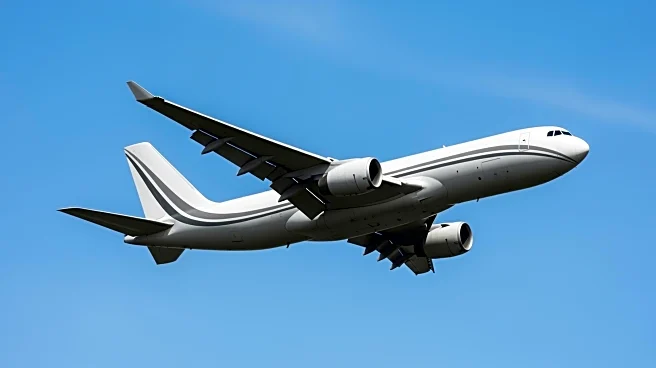What's Happening?
American delivery companies UPS and FedEx have temporarily grounded portions of their cargo fleets following a fatal crash in Kentucky. The incident involved a UPS MD-11 aircraft, which burst into flames
after colliding with nearby business premises during take-off, resulting in a fire that gutted several buildings and closed Louisville International Airport. The crash has claimed at least 14 lives, with ongoing searches for additional victims. Boeing, the manufacturer of the MD-11, recommended the grounding of these planes as a precautionary measure. Both UPS and FedEx have confirmed their compliance with Boeing's recommendation, although the extent of service disruption remains unclear. The MD-11 model, originally manufactured by McDonnell Douglas before its merger with Boeing, ceased production in 2000, and passenger service ended in 2014.
Why It's Important?
The grounding of MD-11 planes by UPS and FedEx, two of the world's largest cargo carriers, could have significant implications for logistics and delivery services across the U.S. These companies play a crucial role in the transportation of time-sensitive goods, including pharmaceuticals and medical devices. The temporary suspension of these aircraft may necessitate adjustments in logistics operations to ensure continued service delivery. The incident also raises concerns about the safety of older aircraft models, potentially prompting regulatory scrutiny and impacting fleet management strategies within the cargo industry. The tragedy underscores the importance of aviation safety and the need for rigorous maintenance and operational protocols.
What's Next?
As investigations into the cause of the Kentucky crash continue, UPS and FedEx have implemented contingency plans to mitigate service disruptions. These plans aim to leverage their integrated air and ground networks to maintain the flow of critical shipments. The National Transportation and Safety Board is examining the crash, particularly the reported engine fire and detachment during take-off. The findings could influence future safety regulations and operational practices for cargo airlines. Stakeholders, including Boeing and other cargo operators using MD-11s, may face increased pressure to ensure the safety and reliability of their fleets.
Beyond the Headlines
The incident highlights broader issues within the aviation industry, particularly concerning the use of aging aircraft models. It may prompt discussions on the balance between operational cost-efficiency and safety standards. The tragedy also brings attention to the ethical responsibilities of manufacturers and operators in ensuring passenger and crew safety. Long-term, this event could lead to shifts in industry practices, including accelerated retirement of older aircraft and increased investment in newer, safer models.












